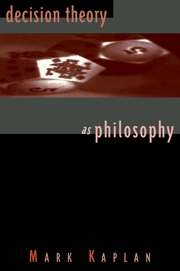Book contents
- Frontmatter
- Contents
- Preface
- Note to the Reader
- CHAPTER ONE Confidence
- CHAPTER TWO Evidence
- CHAPTER THREE The Bayesian Challenge
- CHAPTER FOUR Rational Belief
- CHAPTER FIVE The Bayesian Canon
- CHAPTER SIX Decision Theory as Epistemology
- APPENDIX 1 Principles and Definitions
- APPENDIX 2 Proofs
- APPENDIX 3 Probabilism – Some Elementary Theorems
- Bibliography
- Index
CHAPTER TWO - Evidence
Published online by Cambridge University Press: 05 June 2012
- Frontmatter
- Contents
- Preface
- Note to the Reader
- CHAPTER ONE Confidence
- CHAPTER TWO Evidence
- CHAPTER THREE The Bayesian Challenge
- CHAPTER FOUR Rational Belief
- CHAPTER FIVE The Bayesian Canon
- CHAPTER SIX Decision Theory as Epistemology
- APPENDIX 1 Principles and Definitions
- APPENDIX 2 Proofs
- APPENDIX 3 Probabilism – Some Elementary Theorems
- Bibliography
- Index
Summary
A Puzzle about Evidence
Imagine that a research proposal has just crossed your desk. The proposal does not fall under your area of expertise but you have established that this much is true of it. The investigator proposes an experiment aimed at establishing whether or not e is true; e's truth, she writes, is a consequence of hypothesis h and thus would be evidence of h's truth. What makes this interesting, she claims, is that h entails the prediction e′ that a certain phenomenon will occur by the year 2100 – a prediction that has attracted a certain amount of attention. The investigator writes that, given the foregoing, should her experiment establish that e, she will have thereby provided some evidence in favor of e′. You are satisfied that all the other details of the proposed experiment are well-designed. Should you deem the proposal sound?
Students of Hempel (Hempel 1945) will recognize that the answer is “No.” It is compatible with everything said so far that h is little more – indeed, that it is nothing more – than the cobbling together of e and e′, and that e and e′ are substantially (if not totally) unrelated to one another. In that event h certainly will predict that e and predict that e′. But we do not want to count e as evidence that e′; if we do then we must count every claim as evidence of every other, which is absurd.
- Type
- Chapter
- Information
- Decision Theory as Philosophy , pp. 45 - 88Publisher: Cambridge University PressPrint publication year: 1996

